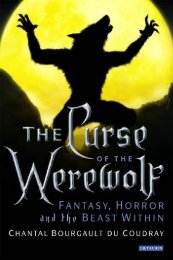- Page 2: feeling very strange
- Page 5 and 6: Feeling Very Strange: The Slipstrea
- Page 7: Acknowledgments We’d like to than
- Page 11 and 12: x | John Kessel & James Patrick Kel
- Page 13 and 14: xii | John Kessel & James Patrick K
- Page 15 and 16: xiv | John Kessel & James Patrick K
- Page 18 and 19: feeling very strange
- Page 20 and 21: Al Carol Emshwiller sort of a plane
- Page 22 and 23: These thoughts went rapidly through
- Page 24 and 25: al | 7 the fact,” I said, “that
- Page 26 and 27: I found it hard to adjust to some o
- Page 28 and 29: al | 11 state should give aid to pa
- Page 30 and 31: al | 13 of international concern in
- Page 32 and 33: the little Magic shop | 15 hammerin
- Page 34 and 35: the little Magic shop | 17 imbibed,
- Page 36 and 37: the little Magic shop | 19 stroking
- Page 38 and 39: the little Magic shop | 21 “Hey,
- Page 40 and 41: the little Magic shop | 23 “Yes,
- Page 42 and 43: the little Magic shop | 25 my stock
- Page 44 and 45: The Healer Aimee Bender the healer
- Page 46 and 47: the healer | 29 He was very rarely
- Page 48 and 49: the healer | 31 he said, she’s nu
- Page 50 and 51: the healer | 33 The ice girl had no
- Page 52 and 53: the healer | 35 had left, but they
- Page 54 and 55: 20th-centurY schizoid art - i | 37
- Page 56 and 57: The Specialist’s Hat Kelly Link t
- Page 58 and 59:
the specialist’s hat | 41 When th
- Page 60 and 61:
the specialist’s hat | 43 the fir
- Page 62 and 63:
the specialist’s hat | 45 the red
- Page 64 and 65:
“Unless you want to,” Claire sa
- Page 66 and 67:
the specialist’s hat | 49 anythin
- Page 68 and 69:
the specialist’s hat | 51 it thro
- Page 70 and 71:
Light and the Sufferer Jonathan Let
- Page 72 and 73:
light and the sufferer | 55 And Don
- Page 74 and 75:
light and the sufferer | 57 the sta
- Page 76 and 77:
light and the sufferer | 59 “Four
- Page 78 and 79:
light and the sufferer | 61 of term
- Page 80 and 81:
light and the sufferer | 63 sucked
- Page 82 and 83:
light and the sufferer | 65 the bac
- Page 84 and 85:
light and the sufferer | 67 Annette
- Page 86 and 87:
light and the sufferer | 69 black O
- Page 88 and 89:
light and the sufferer | 71 As she
- Page 90 and 91:
light and the sufferer | 73 Light,
- Page 92 and 93:
light and the sufferer | 75 us. In
- Page 94 and 95:
light and the sufferer | 77 I tried
- Page 96 and 97:
light and the sufferer | 79 you thi
- Page 98 and 99:
light and the sufferer | 81 “I go
- Page 100 and 101:
light and the sufferer | 83 I shift
- Page 102 and 103:
light and the sufferer | 85 I start
- Page 104 and 105:
Sea Oak George Saunders sea oak | 8
- Page 106 and 107:
sea oak | 89 shit. If we had our di
- Page 108 and 109:
sea oak | 91 pretty. A raccoon scur
- Page 110 and 111:
sea oak | 93 At home Min and Jade a
- Page 112 and 113:
sea oak | 95 We bury her at St. Leo
- Page 114 and 115:
sea oak | 97 “All’s we need is
- Page 116 and 117:
sea oak | 99 “But how?” says Ja
- Page 118 and 119:
sea oak | 101 am I supposed to do,
- Page 120 and 121:
sea oak | 103 “Put it over me, yo
- Page 122 and 123:
sea oak | 105 barely wear a blouse.
- Page 124 and 125:
sea oak | 107 for you? I’m saving
- Page 126 and 127:
sea oak | 109 me. I’m fucked. As
- Page 128 and 129:
sea oak | 111 died disappointed? ca
- Page 130 and 131:
20th-centurY schizoid art - ii | 11
- Page 132 and 133:
20th-centurY schizoid art - ii | 11
- Page 134 and 135:
eXhibit h: torn pages | 117 uniform
- Page 136 and 137:
eXhibit h: torn pages | 119 ily if
- Page 138 and 139:
eXhibit h: torn pages | 121 However
- Page 140 and 141:
Hell Is the Absence of God Ted Chia
- Page 142 and 143:
hell is the absence of god | 125 me
- Page 144 and 145:
hell is the absence of god | 127 bu
- Page 146 and 147:
hell is the absence of god | 129 th
- Page 148 and 149:
hell is the absence of god | 131 sh
- Page 150 and 151:
hell is the absence of god | 133 pr
- Page 152 and 153:
hell is the absence of god | 135 ro
- Page 154 and 155:
hell is the absence of god | 137 be
- Page 156 and 157:
hell is the absence of god | 139 hi
- Page 158 and 159:
hell is the absence of god | 141 re
- Page 160 and 161:
hell is the absence of god | 143 sh
- Page 162 and 163:
hell is the absence of god | 145 As
- Page 164 and 165:
hell is the absence of god | 147 It
- Page 166 and 167:
hell is the absence of god | 149 be
- Page 168 and 169:
Lieserl Karen Joy Fowler lieserl |
- Page 170 and 171:
lieserl | 153 E, making such a swee
- Page 172 and 173:
lieserl | 155 tivity. She will blam
- Page 174 and 175:
lieserl | 157 her legs longer than
- Page 176 and 177:
Bright Morning Jeffrey Ford bright
- Page 178 and 179:
ight Morning | 161 about, a secret
- Page 180 and 181:
ight Morning | 163 He handed it ove
- Page 182 and 183:
ight Morning | 165 taking me throug
- Page 184 and 185:
ight Morning | 167 Susquehanna goth
- Page 186 and 187:
ight Morning | 169 “What’s up?
- Page 188 and 189:
ight Morning | 171 same time, I was
- Page 190 and 191:
ight Morning | 173 the words are wr
- Page 192 and 193:
ight Morning | 175 “That seems ra
- Page 194 and 195:
ight Morning | 177 attests to his f
- Page 196 and 197:
ight Morning | 179 I had been sligh
- Page 198 and 199:
20th-centurY schizoid art - iii | 1
- Page 200 and 201:
20th-centurY schizoid art - iii | 1
- Page 202 and 203:
iographical notes to “a discourse
- Page 204 and 205:
iographical notes to “a discourse
- Page 206 and 207:
iographical notes to “a discourse
- Page 208 and 209:
iographical notes to “a discourse
- Page 210 and 211:
iographical notes to “a discourse
- Page 212 and 213:
iographical notes to “a discourse
- Page 214 and 215:
iographical notes to “a discourse
- Page 216 and 217:
iographical notes to “a discourse
- Page 218 and 219:
iographical notes to “a discourse
- Page 220 and 221:
iographical notes to “a discourse
- Page 222 and 223:
iographical notes to “a discourse
- Page 224 and 225:
iographical notes to “a discourse
- Page 226 and 227:
the god of dark laughter | 209 cont
- Page 228 and 229:
the god of dark laughter | 211 “I
- Page 230 and 231:
the god of dark laughter | 213 indu
- Page 232 and 233:
the god of dark laughter | 215 head
- Page 234 and 235:
the god of dark laughter | 217 thus
- Page 236 and 237:
the god of dark laughter | 219 nigh
- Page 238 and 239:
the god of dark laughter | 221 ence
- Page 240 and 241:
the god of dark laughter | 223 All
- Page 242 and 243:
the god of dark laughter | 225 Arou
- Page 244 and 245:
the god of dark laughter | 227 I do
- Page 246 and 247:
the rose in tWelVe petals | 229 the
- Page 248 and 249:
the rose in tWelVe petals | 231 hem
- Page 250 and 251:
the rose in tWelVe petals | 233 he
- Page 252 and 253:
the rose in tWelVe petals | 235 “
- Page 254 and 255:
the rose in tWelVe petals | 237 nov
- Page 256 and 257:
the rose in tWelVe petals | 239 iX.
- Page 258 and 259:
the rose in tWelVe petals | 241 has
- Page 260 and 261:
20th-centurY schizoid art - iV | 24
- Page 262 and 263:
the rose in tWelVe petals | 245 tha
- Page 264 and 265:
20th-centurY schizoid art - iV | 24
- Page 266 and 267:
20th-centurY schizoid art - iV | 24
- Page 268 and 269:
the lions are asleep this night | 2
- Page 270 and 271:
the lions are asleep this night | 2
- Page 272 and 273:
the lions are asleep this night | 2
- Page 274 and 275:
the lions are asleep this night | 2
- Page 276 and 277:
the lions are asleep this night | 2
- Page 278 and 279:
the lions are asleep this night | 2
- Page 280 and 281:
the lions are asleep this night | 2
- Page 282 and 283:
the lions are asleep this night | 2
- Page 284 and 285:
the lions are asleep this night | 2
- Page 286 and 287:
the lions are asleep this night | 2
- Page 288 and 289:
the lions are asleep this night | 2
- Page 290 and 291:
You haVe neVer been here | 273 city
- Page 292 and 293:
You haVe neVer been here | 275 It
- Page 294 and 295:
You haVe neVer been here | 277 That
- Page 296 and 297:
You haVe neVer been here | 279 Than
- Page 298 and 299:
You haVe neVer been here | 281 enou
- Page 300 and 301:
You haVe neVer been here | 283 hand
- Page 302 and 303:
Author Notes author notes | 285 aiM
- Page 304 and 305:
author notes | 287 Award), and most





